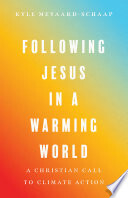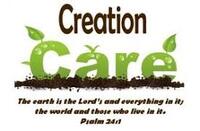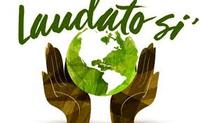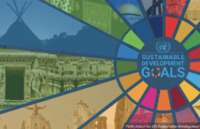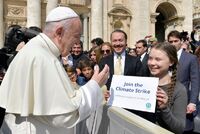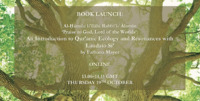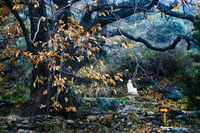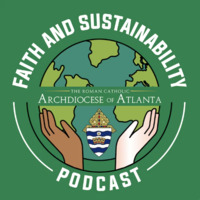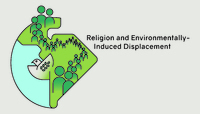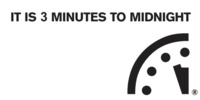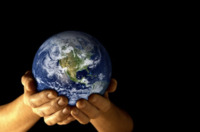Search
288 items
-
Earth Day Action Toolkit
"Every April 22nd, stakeholders of all backgrounds come together to advance sustainability and climate action in commemoration of Earth Day. Our world needs transformation. It’s time for the people of the world to hold governments and the private sector accountable for their role in our environmental crisis while also calling for bold, creative, and innovative solutions. This will require action at all levels, from business and investment to city and national government.
That’s where you come in: as an individual, you yield real power for change through your influence as a consumer, a voter, and a community member.
Don’t underestimate your power. When your voice and actions are united with millions of others around the world, we can create an inclusive and impactful movement that is impossible to ignore.
Throughout April, we commemorate Earth Month with marches, rallies, volunteer events, and more. United together, we’ll drive a year of energy, enthusiasm, and commitment to a sustainable and equitable future for our planet." -
Faith groups increasingly join fight against climate change
There are many faith groups that help with climate disasters. In the article, places like Louisiana, and how places that have been very important to people could soon disappear. It talks about how faith leaders and environmentalists have been working together. -
The Sacredness of Water
This chapter from the student-written book “Emerging Perspectives on Religion and Environmental Values in America” explores the importance of water across religious traditions and modern life. It explores the importance of water for survival but also as a gift that frequently acts as a spiritual symbol. Below is the first paragraph of the chapter to introduce the discussion.
"Pick up any religious text and you are likely to find at least one reference to water. Whether it is used to cleanse, bathe, heal, restore, replenish, or purify: water is one of the most prolific symbols in major world religions, stretching through time, place, and culture. As human beings, this may come as no surprise seeing how our bodies are composed mostly of water, and we rely on it for our very survival – a truth that continues to become more resonant as the effects of climate change take hold in the forms of drought, rising temperatures, and natural disasters. Like many religious symbols, water appears in scripture, ritual and tradition through its simplicity and use in everyday life. In examining a variety of major world religions, namely Islam, Judaism, Hinduism and Christianity, connections between water as a common resource, and water as a sacred and holy gift become apparent. Drawing from these unique and similar understandings of water, we can begin to consider the spiritual motivations one might have in engaging in water conservation efforts. Furthermore, in exploring these religions specifically, we can identify some beliefs about water that may provide helpful wisdom in the face of more rational conversations surrounding water conservation. Because these religions have such strong relationships with water and large followings worldwide, there is hope that these connections between scripture and our contemporary crisis may be brought to life to move toward a more secure and just future." -
Following Jesus in a Warming World: A Christian Call to Climate Action
"Have you ever looked at the effects of climate change and the apathy of so many around you and wondered, 'What are we missing here?'
Climate activist Kyle Meyaard-Schaap understands this feeling from personal experience. But in his years of speaking to and equipping Christians to work for climate action, he's seen the trend begin to shift. More and more young Christians are waking up to the realities of climate change. They want to help, but they're not sure how.
Through stories from the field, theological and scriptural exploration, and practical advice, Meyaard-Schaap offers hope to Christians paralyzed by the scale of the crisis, helping us turn our paralysis into meaningful action. Following Jesus in a Warming World is a field guide for Christian climate action—one grounded not in a sense of guilt or drudgery, but in the joy of caring for creation." -
Scripture Sunday: Invitation to the Thirsty
"Walter Bruggeman has said that the task of the prophet is 'to nurture, nourish, and evoke a consciousness and perception alternative to the consciousness and perception of the dominant culture around us.' Here in Deutero-Isaiah, the Israelites who have been exiled are given a vision of hope, Isaiah is evoking a reality far different from what they know. In the previous chapter, God says, in one of my favorite verses, 'For a brief moment I abandoned you, but with deep compassion I will bring you back. In a surge of anger I hid my face from you for a moment, but with everlasting kindness I will have compassion on you… My unfailing love for you will not be shaken nor my covenant of peace be removed' (Isaiah 54:7-10). This is the climax of the second book of Isaiah, that God’s anger towards injustice and the consequences of it are momentary, but God’s compassion, love, and faithfulness are everlasting, something we can never be separated from. Isaiah 55 then flows into the specifics of that love. God’s invitation into divine care is one that freely gives water, food, and rest." -
A Bluer Theology: Protecting and Restoring God’s Marine Creation
"Blue Theology was founded in 2008 by Rev. Dan Paul and Rev. Deborah Streeter. Streeter coined the term “Blue Theology” as a theological approach that weaves together marine biology and Christian theology. Over the next few years, the Church, only blocks from the Pacific Ocean, began hosting weeklong groups to engage in learning-serving experiences with God’s marine creation. Over the last two years, Blue Theology Outposts have opened in Newport Beach, CA, Texas City, TX, and Beaufort, NC. The mission of the Blue Theology program is to provide learning and serving experiences in ocean conservation while fostering heart connections to the sea." -
Sacred Lands, Sacred Waters: Theological Reflections on This Sacred World
"The lands and waters of this world are sacred places. We know it when we rest in them and we know it from our sacred texts. As Christians, to see the world as creation is to see the world as sacred.
This resource includes theological reflections from Karyn Bigelow, Avery Lamb, Dr. Miguel A. de la Torre, Rev. Victoria Loorz, Rev. Dan Paul, and Rev. Dr. Randy Woodley.
This resource was originally published for Season of Creation 2022." -
Creation Care Column
The Creation Care Column is a weekly column by Elliott Bush that is posted through St. Stephens Episcopal Church's (Columbus) website. Here Bush discusses current environmental events, tips for living a sustainable life, and much more all in the name of caring for God's creation. Bush also provides a wide array of environmental sources to allow readers to continue their education on their own. For example, in one of the most recent posts, Bush speaks about changes in plastic pollution efforts and encourages readers to check out Katherine Hayoe's weekly newsletter or Green America to find out more information. -
Laudato Si’ -- On Care For Our Common Home
Laudato Si appears to be increasing interactions between environmental professionals and faith communities, and as such, is a very important document for all people to understand–not just Catholics! Roman Catholicism is the largest religious denomination in the world (1.2 billion). An encyclical is one of the most authoritative declarations that a Pope can put forth. Laudato Si is both a reflection of the larger moral and religious landscape of environmental values, and perhaps simply the most prominent such statement of values yet crafted. It is symbolic of this moment in time when religious and ethical voices are gaining currency in environmental thinking, regardless of any particular doctrine.
-
Sustainability Photo Contest
This RESTORExchange photo contest is being brought back from the pre-COVID era, and with an added collaboration with the Sustainability Institute. It's based around the question "What does sustainability look like?" This can include sustainability in environmental justice, technology, energy, lifestyle and wellbeing, society and culture, economy and politics, and any other context where you see sustainability in action. We want to see your perspectives and show all the different places that sustainability is practiced! Winning photos will be decided by a panel of judges (yet to be determined), and the top four photos will win a prize! First place will receive $400, second place will receive $300, third place will receive $200, and an honorable mention will receive $100. Submissions will be accepted through March 15, 2023. -
Faith for Earth Initiative
"Promoting faith leadership, faith-based organizations and communities as custodians of far-reaching, value-based perspectives on environmental sustainability.
Religion and spirituality hold tremendous wisdom for the protection and conservation of our earth, inspiring both religious and secular actors to advocate for stronger political will and lead by example. Find out why faith and environment matters.
A three-pronged approach drives this Initiative:
Strengthening partnership with faith-based organization’s leadership for policy impact;
Greening faith-based organization’s investments, operations and assets; and
Establishing an accessible knowledge-based support system using faith scripts and scientific evidence." -
Faith Action on UN Sustainable Development Goals: Database
"UNEP adopts innovative communication as a driving force for empowered environmental advocacy. For the first time, a database dedicated to the collection of projects and activities demonstrate how faith, indigenous and local communities contribute to the Sustainable Development Goals." -
In 'Laudate Deum,' Pope Francis presents a compelling climate crisis apologia
"With a degree of urgency appropriate for the planetary catastrophe we face today, Pope Francis' latest apostolic exhortation, Laudate Deum, 'to all people of good will on the climate crisis,' builds on the important insights of his 2015 encyclical letter 'Laudato Si', On Care for our Common Home.' That the pope has explicitly described the current state of the climate as a 'crisis' could be viewed as affirming what climate activist Greta Thunberg said in her 2019 address at the World Economic Forum in Davos, Switzerland: 'Our house is on fire. I am here to say, our house is on fire.' " -
Book Launch: Qur’anic Ecology and Resonances with Laudato Si’
"The Laudato Si' Research Institute and the United Nations Environment Program (UNEP) Faith for Earth Initiative cordially invite you to attend this online book launch for An Introduction to Qur’anic Ecology and Resonances with Laudato Si’, by Farhana Mayer.
The launch will consist of an introduction to the text by Farhana Mayer, followed by responses from scholars and practitioners including Revd Prof. Joshtrom Kureethadam (Vatican Dicastery for Promoting Integral Human Development; Pontifical Salesian University), Prof. Ibrahim Özdemir (Uskudar University; member of drafting team for Al-Mizan: A Covenant for the Earth) and Dr. Iyad Abu Moghli (UNEP, Faith for Earth). There will be an opportunity for Q&A at the end.
This event will take place online [on October 19, 2023 from 1pm to 2:15 EST]. After you have registered, we will be in touch with the link to join." -
Presentation of the Apostolic Exhortation: "Laudate Deum"
This video contains discussion of Pope Francis' newly released Laudate Deum, as well as comments on how it connects with Laudato Si' and applies to future action. Environmental and religious activists, experts, and scholars speak on the issue as it relates to their field. The speakers explain possible ways to incorporate the information discussed in Laudate Deum and other knowledge surrounding climate change can be incorporated and developed into courses of action to address the climate crisis. -
Advent Simplicity Challenge
"This Advent, commit to simplicity. In a season that can mistakenly be focused on gifts and consumption, explore ways to live simply as we hopefully prepare for the coming of Jesus and the restoration of the earth. This year, we’ll be mixing in new daily challenges, as well as accompanying PDFs for folks who prefer not to use the interactive calendar." -
Prayers and Meditations for UNCOP28
"Our invitation to you and request of you on behalf of the ILC? We encourage people of all faiths to offer their prayers and meditations towards a beneficial UNCOP 28.
Our prayer and meditation around the world has helped the previous COP’s .This was the feedback we have received. The picture above is of Prayer and Meditation at COP26 in Glasgow. Not pictured are those who offered their spiritual practice at that time from many other places in the world. Our invitation is that we continue what we have begun with a renewed sincerity of commitment." -
From the Ground Up: An Adult Outdoor Education Program
AKA Our Deen is Green! for Adults"We are happy to announce that applications are now being accepted for From the Ground Up: An Adult Outdoor Education Program (aka Our Deen is Green! for adults). This special program, funded by a grant from the National Park Service Chesapeake Gateways Office, will begin after Ramadan, in late April 2024, and continue into spring of 2025. It is a unique opportunity to become immersed in the various facets of ecology, environmental science, sustainability and stewardship. It will include monthly classes, mostly in-person and outdoors in parks and wildlife sanctuaries in DC, Maryland, and Northern Virginia, focused on specific aspects of and issues pertaining to our local region, the Chesapeake Bay Watershed.
Classes will be led by local subject matter experts and include a variety of topics, including local plants and animals, the interconnectedness of our watershed, the challenges it’s facing, and what we can do to help. Specific classes will include:
· An introduction to the Chesapeake Bay Watershed
· Local herps: reptiles and amphibians
· Monitoring stream health with benthic macroinvertebrates
· Stream restoration and invasive plant removal
· The importance of native plants and pollinator gardens
· Watershed education through an interfaith lens
· Native trees
· Soil health
· Environmental justice
· Local birds and “bugs”
· Solar power and clean energy
· Sustainable living
· Water-quality monitoring
· And more!
We are looking for 10-15 strongly committed local residents who are interested in learning about our local watershed, its needs, and what they can do to help it. Participants will be encouraged to create a long-term project or plan of action describing something they will do to support the watershed and/or encourage their families or communities to pay more attention to environmental issues.
Program participants must be able to commit to the majority of the monthly classes. All in-person classes will take place on weekends and last 2 to 4 hours. (We will do our best to help provide transportation if necessary.)
This entire program is being offered free of charge thanks to a National Park Service Chesapeake Gateways grant. The National Park Service Chesapeake Gateways Office (NPS Chesapeake Gateways) offers competitive grant opportunities to advance the Chesapeake Bay Initiative Act of 1998 within the full 41-million-acre Chesapeake Bay watershed. Chesapeake Gateways grants bring out familiar, untold, under-appreciated, or yet to be uncovered narratives and promote resilient communities & landscapes through tourism, sustainability, conservation & local economies throughout the Chesapeake Bay watershed.
The program begins after Ramadan, with the introductory class set for April 21st! Applications are due by March 8th. Access the application form below. Please reach out to us at contact@greenmuslims.org with any questions." -
The World on Fire: A Buddhist Response to the Environmental Crisis
The World on Fire: A Buddhist Response to the Environmental Crisis by Katie Javanaud explores how Buddhist teachings can inspire environmental activism. Javanaud examines key Buddhist sermons, such as the "Fire Sermon," which metaphorically portrays the world consumed by the flames of greed, hatred, and delusion, resonating deeply with contemporary environmental challenges.
Greed is identified as a driving force behind the environmental crisis, fueling overconsumption and disregard for ecological balance. Javanaud illustrates how Buddhist principles offer insights to counteract societal norms of materialism and promote mindful living.
The article addresses common objections to applying Buddhist teachings to environmentalism, providing valuable perspectives for those interested in integrating spirituality with environmental activism. This article serves as a concise introduction to Buddhist environmentalism, offering clarity on the compatibility of Buddhist values with ecological stewardship. -
Faith and Sustainability Podcast
The Faith and Sustainability podcast is a project created by the Archdiocese of Atlanta as part of their Laudato Si Initiative. Host Leonard Robinson is joined every week by influential members of different faith communities and environmental experts, where they discuss a wide range of topics like environmental justice, how to recycle, and climate change. The Faith and Sustainability podcast explores how faith and sustainability connect, and finding out how to better care for our planet. -
Religion and Environmentally-Induced Displacement
The goal of this project is to enhance people's understanding of the religious response to environmental displacement in Latin America. This database includes a list of past workshops and public events related to the subject as well as relevant documentaries on the topic. -
Why Conservative Christians Don’t Believe in Climate Change
"American Christians have become increasingly polarized on issues of climate change and environmental regulation. In recent years, mainline Protestant denominations and the Roman Catholic Church have made explicit declarations of support for global climate action. Prominent Southern Baptists and other evangelical Protestants, on the other hand, have issued statements that are strikingly similar to the talking points of secular climate skeptics, and have attempted to stamp out 'green' efforts within their own ranks. An analysis of resolutions and campaigns by evangelicals over the past 40 years shows that anti-environmentalism within conservative Christianity stems from fears that 'stewardship' of God's creation is drifting toward
neo-pagan nature worship, and from apocalyptic beliefs about 'end times' that make it pointless to worry about global warming. As the climate crisis deepens, the moral authority of Christian leaders and organizations may play a decisive role in swaying public policy toward (or away from) action to mitigate global warming." -
Threat of Global Warming/Climate Change - 2006 Statement of Conscience
This resource contains the climate statement of the Unitarian Universalist Association.
"Earth is our home. We are part of this world and its destiny is our own. Life on this planet will be gravely affected unless we embrace new practices, ethics, and values to guide our lives on a warming planet. As Unitarian Universalists, how can our faith inform our actions to remedy and mitigate global warming/climate change? We declare by this Statement of Conscience that we will not acquiesce to the ongoing degradation and destruction of life that human actions are leaving to our children and grandchildren. We as Unitarian Universalists are called to join with others to halt practices that fuel global warming/climate change, to instigate sustainable alternatives, and to mitigate the impending effects of global warming/climate change with just and ethical responses. As a people of faith, we commit to a renewed reverence for life and respect for the interdependent web of all existence." -
How Religion Intersects With Americans' View on the Environment
Through this study, they intended to obtain information about how religious Americans view climate change. This article explains the results of a survey. It shows how some religious Americans express little concern about climate change, and carry the belief that “there are much bigger problems in the world, that God is in control of the climate.” Additionally, some say that “they do not believe the climate is actually changing.” This survey also sheds light on other concerns religious Americans carry, such as fear surrounding the consequences of environmental regulations (fewer jobs, increased energy prices, and loss of individual freedoms).
Additionally, the survey extends to other religious affiliations as well as the religiously unaffiliated population. -
Turning Around Our Relationship with Earth is a Teshuvah Project
The author recounts an unsettling encounter with a utility worker who downplayed the environmental harm of her gas leak. From here, she explains the true negative impacts of methane emissions on both people and the climate, and encourages us to act in a way that "turns around our relationship with Earth". She connects this with the Jewish tradition of Teshuvah, the time in between Rosh Hashanah and Yom Kuppur meant for repentance.




